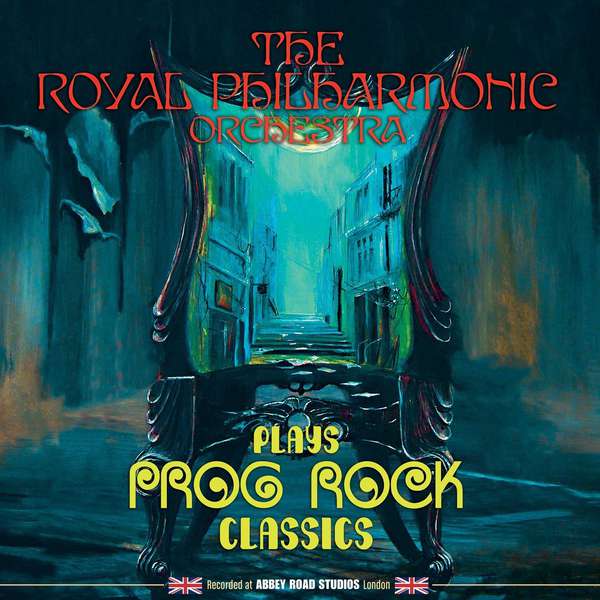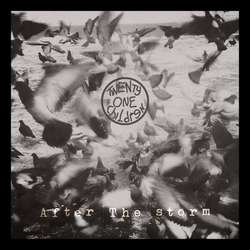At a point in the late '90s and early-to-mid 2000s, it seemed like every major artist had at least one tribute album out there. Invariably produced by one cheap-jack record label or another, these albums highlighted a dozen or so no-name musicians playing through (and quite possibly butchering) various well-known songs and were often framed around a particular type of arrangement style. As might be expected, the quality varied wildly from album to album - even from track to track - and some tribute records were straight-up baffling: while I could understand things like the “goth rock tribute” to Nine Inch Nails, a lullaby version of “Closer” seems a bit uncalled-for. The tribute album phenomenon seems to have died down over the past decade – perhaps this is not all that surprising considering how sketchy the (existent) Piano Tribute to Skrillex sounds. Of all the tribute-type albums out there however, 2015's Royal Philharmonic Orchestra Plays Prog Rock Classics probably ranks among the ones that make the most sense on some level.
If ever there was a genre of popular music that lent itself toward symphonic arrangement, progressive rock had to be it. Artists working this genre produced sprawling compositions that worked through motifs and themes and were crafted in much the same manner as classical music. Furthermore, though I wouldn't even want to imagine what kind of mess would result from writing out some of today's popular music, sheet music arrangement of the typical Emerson Lake and Palmer or Yes song is not only easy to visualize, but would seem to be quite performable. Back in music school, my father toyed with the idea of arranging Yes's 1973 Tales from the Topographic Oceans as an orchestral piece, so I was kind of interested to see what the London-based Royal Philharmonic, one of the most recognized musical institutions in the world, would be able to accomplish on this album.
Though their Prog Rock Classics album sounds quite grandiose at times, it's not exactly what I would have expected, and winds up being somewhat disappointing. For one thing, most of the ten songs included here don't strike me as the type of expansive progressive rock that is most suited to – and maybe even demands – performance by an orchestra. While the opening “ELP Suite” is generally compatible with the format (not surprising, given Emerson, Lake and Palmer keyboardist Keith Emerson's penchant for classical arrangement and composition), Pink Floyd's “Comfortably Numb” doesn't entirely gel – the song seems to have been chosen simply because listeners would likely recognize it by name. Versions of Yes's “Roundabout” and King Crimson's “21st Century Schizoid Man,” meanwhile, wind up sounding only marginally better than corny and smarmy elevator music.
A further problem I had with this album was that it features the use of electric guitar and bass. Several of the Royal Philharmonic arrangements sound virtually identical to the original band recordings – not alternate arrangements as much as instrumental back-up tracks or slightly-altered facsimiles. This is a perplexing decision on the part of the album producers: if one is picking up an album of “symphonic” arrangements of prog rock classics, why would the actual instrumentation heard on the original tracks be used? Again, I think part of the reason for this was the fact that the Cleopatra Records label (who have released many a hit-or-miss tribute album over the years) wanted to move some copies of this record: the more these tracks sound like the original versions, the more listener interest one would think would be generated. Several noted personalities from the prog genre (including Moody Blues keyboardist Patrick Moraz, Porcupine Tree drummer Gavin Harrison, and Three Dog Night guitarist Jimmy Greenspoon in one of his last recorded performances) feature on – and provide some credibility to - the record, but I'm not sure these guest appearances add much to the proceedings.
Despite my issues with the concept and execution of the album, the instrumental performances on the album are superb (as I would have expected) and the disc is pleasant enough to listen to. Several of the tracks here are also pretty nifty in the way they play out. The arrangement and instrumentation in The Moody Blues's “Nights in White Satin” is gorgeous (though frankly, I find this song to be overplayed), and Jethro Tull's “Thick as a Brick” sounds almost medieval as imagined here, working through bombastic segments before settling into quieter fiddle-and-flute-driven dance interludes. An expressive rendition of “Focus II” features original musician Thijs van Leer playing flute throughout, and Gentle Giant's sweeping “Think of Me with Kindness” is transformed into a magical, triumphant piece that may as well have been pulled out of a Disney film. Alternately sinister and rousing, the arrangement of the early Genesis track “Watcher of the Skies” leads into arguably the album's most sprawling number, a version of Rush's “Red Barchetta” which includes a vocal choir and finishes with a solo from Iron Maiden guitarist Adrian Smith that almost makes up for its cheesy pub band bass.
At the end of the day, The Royal Philharmonic Orchestra Plays Prog Rock Classics is something that I'd only moderately recommend. The album is capably-performed but uninspired, seeming to be an attempt to capitalize on a group of ardent genre fans typically forgotten by the mainstream music industry. I suppose the record would hold some interest to those who recognize the tunes on it, providing a relaxing and warm nostalgia. Still, since these very listeners probably have the original albums these songs were taken from, what's the point?




